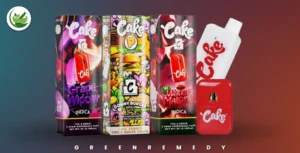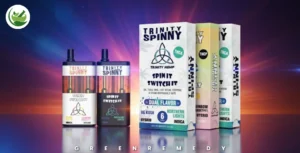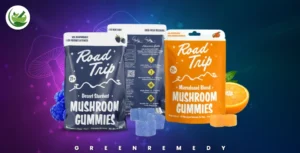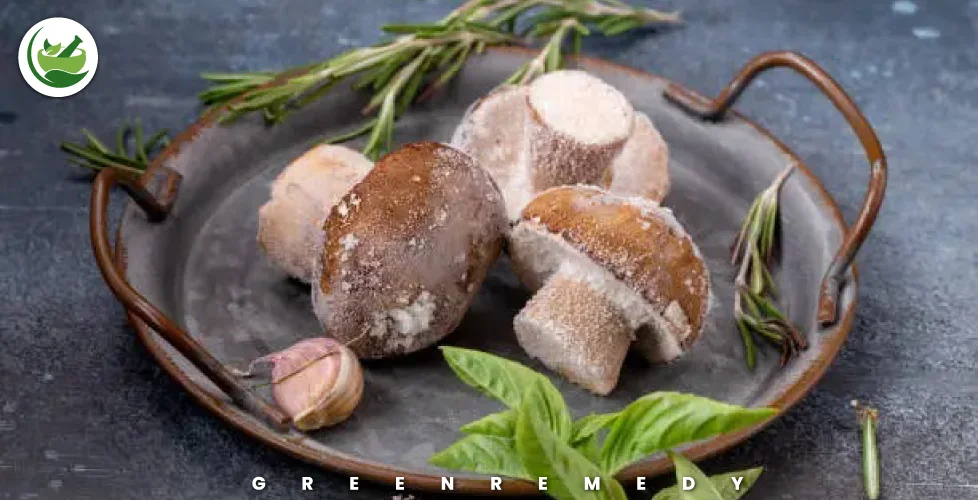
Mushrooms are a kitchen favorite, adding rich flavor, meaty texture, and umami to everything from soups to pastas and stir-fries. But if you’ve ever bought a large pack and watched some spoil before you could use them, you’ve probably wondered: can you freeze mushrooms without losing their taste or texture? The good news is yes—you can! When done correctly, freezing mushrooms preserves their flavor, maintains their texture, and gives you ready-to-use mushrooms anytime. In this guide, we’ll show you exactly how to freeze mushrooms the right way so they stay fresh and delicious months after purchase.
In this detailed freezing mushrooms guide, we’ll cover everything you need to know:
- Can you freeze raw mushrooms or cooked mushrooms?
- How to prepare mushrooms for freezing.
- The best way to freeze mushrooms without losing flavor.
- How to cook frozen mushrooms to bring out the best results.
Why Consider Freezing Mushrooms?
Fresh mushrooms typically last about 5 to 7 days in the refrigerator. After that, they start to develop dark spots, slimy texture, and eventually lose flavor. If you often find yourself throwing away mushrooms that go bad too quickly, freezing is an excellent solution.
Freezing mushrooms offers several benefits:
- Reduces food waste – You don’t have to toss unused mushrooms.
- Saves money – Buying in bulk and freezing helps cut costs.
- Convenience – Having frozen mushrooms ready makes cooking easier.
- Extended shelf life – Properly frozen mushrooms last up to 12 months in the freezer.
Read More: What are the healthiest mushrooms to buy?
Can You Freeze Raw Mushrooms?
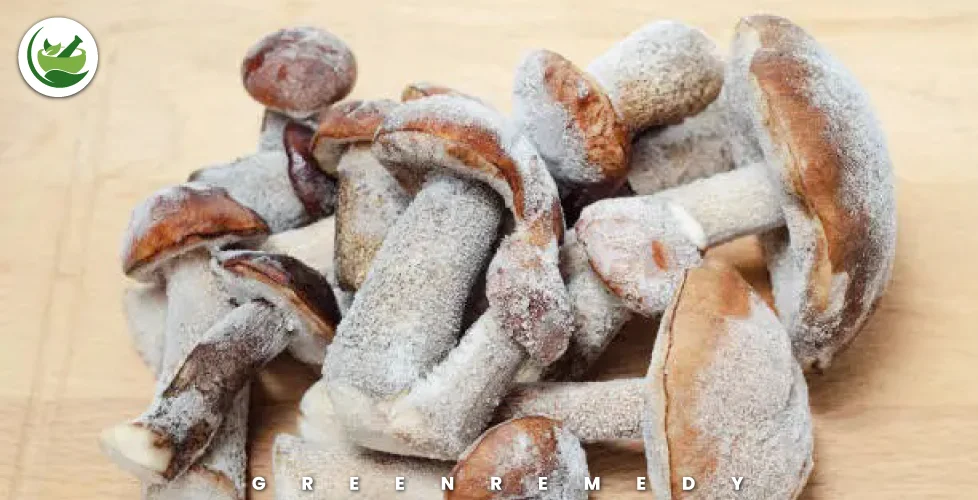
Yes, you can freeze raw mushrooms, but it’s not always the best option. Raw mushrooms contain a high water content, which means that when thawed, they can turn soggy or lose their firm texture.
If you choose to freeze raw mushrooms, here are a few tips:
- Select mushrooms that are firm, fresh, and blemish-free.
- Wash them gently and pat completely dry before freezing.
- Slice or leave them whole depending on how you plan to use them later.
- Place mushrooms on a baking sheet in a single layer and flash-freeze for 1-2 hours before transferring them to freezer bags.
Flash freezing prevents mushrooms from clumping together and makes it easier to grab only the portion you need later.
Can You Freeze Cooked Mushrooms?
Freezing cooked mushrooms is often a better choice than freezing them raw. Cooking removes some of the water content and helps preserve both texture and flavor.
You can cook mushrooms before freezing in a few ways:
- Sautéing – Lightly sauté mushrooms in a bit of butter or olive oil until just tender. Allow them to cool completely before freezing.
- Blanching – Boil mushrooms briefly (2-3 minutes), then transfer them to an ice bath to stop the cooking process. Drain thoroughly and freeze.
- Roasting – Roasting mushrooms at high heat can deepen their flavor and make them freezer-friendly.
So, can you freeze cooked mushrooms? Absolutely—and many experts recommend this method as the best way to freeze mushrooms while maintaining flavor.
Read More: Mushrooms: The Ultimate Brain Food for Memory and Focus
How to Prepare Mushrooms for Freezing
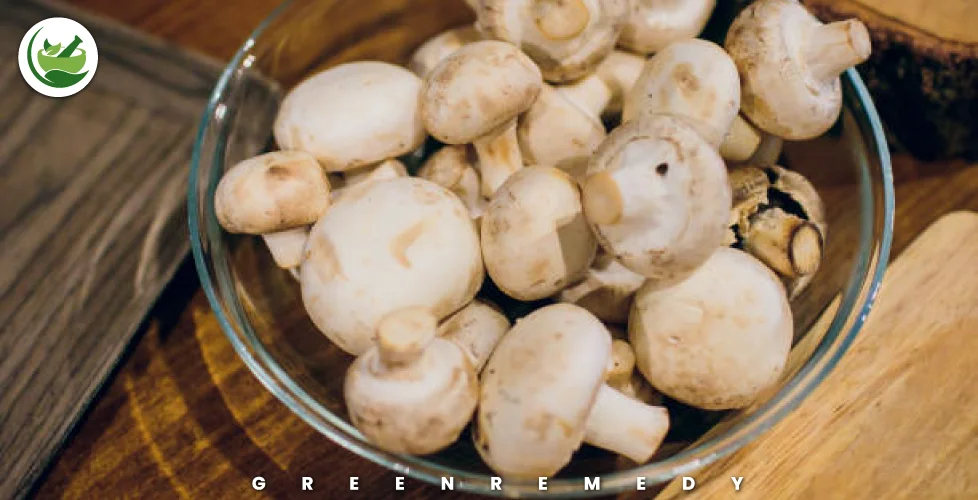
Preparation is the most important step in ensuring your mushrooms taste delicious after freezing. Follow this step-by-step process:
- Choose the Right Mushrooms
- Opt for fresh, firm mushrooms such as button, cremini, portobello, or shiitake. Avoid mushrooms that are slimy or wrinkled.
- Opt for fresh, firm mushrooms such as button, cremini, portobello, or shiitake. Avoid mushrooms that are slimy or wrinkled.
- Clean Gently
- Wipe mushrooms with a damp paper towel or brush off dirt. Avoid soaking them in water, as mushrooms act like sponges and absorb moisture.
- Wipe mushrooms with a damp paper towel or brush off dirt. Avoid soaking them in water, as mushrooms act like sponges and absorb moisture.
- Trim and Slice
- Remove woody stems, if any, and slice or chop mushrooms according to your future cooking plans.
- Remove woody stems, if any, and slice or chop mushrooms according to your future cooking plans.
- Decide: Raw or Cooked
- If you want convenience and better flavor retention, cook them lightly before freezing.
- If you prefer flexibility, freeze them raw but understand they may be softer after thawing.
- Portion Control
- Freeze in small portions (1-2 cups) so you can easily grab the amount you need without defrosting the entire batch.
How to Freeze Mushrooms Without Losing Flavor
If you’re wondering can you freeze mushrooms without losing flavor, the secret lies in the cooking method. Sautéing or blanching before freezing locks in flavor, prevents sogginess, and makes mushrooms easier to use in cooked dishes later.
Here’s the best way to freeze mushrooms step by step:
- Sauté Method
- Heat a small amount of butter or oil in a skillet.
- Add mushrooms and cook for 3-5 minutes until just tender (do not overcook).
- Let them cool completely.
- Spread on a baking sheet, flash-freeze, then transfer to airtight freezer bags.
- Blanching Method
- Bring a pot of water to a boil.
- Add mushrooms and blanch for 2-3 minutes.
- Immediately transfer to ice water to stop cooking.
- Drain well and freeze in airtight containers.
Both methods help preserve texture and flavor, ensuring mushrooms taste fresh even after months in the freezer.
How to Cook Frozen Mushrooms
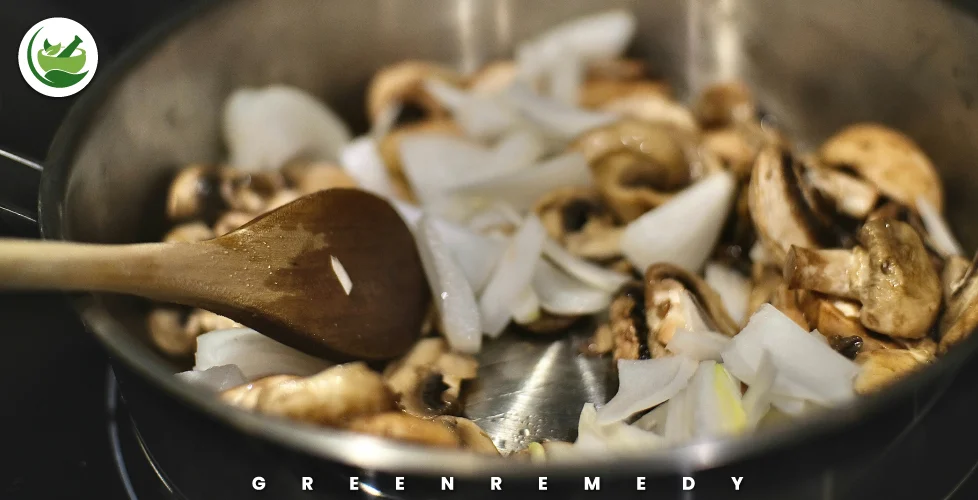
Once your mushrooms are frozen, you might be wondering how to use them. The good news is that frozen mushrooms are incredibly versatile.
Here’s a guide on how to cook frozen mushrooms:
- Do not thaw completely before cooking – Mushrooms release water as they thaw, so it’s best to add them directly to hot dishes.
- Use in Soups and Stews – Toss frozen mushrooms straight into boiling broth or stew for rich flavor.
- Add to Pasta and Risottos – Frozen mushrooms can be sautéed directly in a pan with garlic, onion, and butter for a delicious pasta or risotto base.
- Use in Stir-Fries – High-heat cooking helps evaporate excess water quickly, keeping mushrooms flavorful and tender.
- In Omelets or Scrambles – Add frozen mushrooms directly into your eggs for a quick and easy breakfast.
If you want to roast or grill mushrooms, it’s best to thaw them first and pat them dry to avoid excess water interfering with caramelization.
Read More: Mushrooms: The Ultimate Brain Food for Memory and Focus
Mushroom Types, Cooking Tips & Nutrition Facts
Discover the Flavors, Best Cooking Methods, and Health Benefits of Popular Mushrooms.
| Mushroom | Flavor | Best Cooking | Popular Dishes | Nutrition (per 100g) |
| Button | Mild | Sauté, roast | Pasta, pizza, soups | 22 kcal, 3g protein, B vitamins |
| Cremini | Nutty | Sauté, stir-fry | Risotto, sauces | 25 kcal, 2.5g protein, potassium |
| Portobello | Meaty | Grill, roast | Burgers, steaks | 29 kcal, 2.1g protein, fiber |
| Shiitake | Smoky | Sauté, soups | Asian dishes, ramen | 34 kcal, 2.2g protein, vitamin D |
| Oyster | Sweet | Sauté, stir-fry | Pasta, soups | 33 kcal, 3.3g protein, iron |
| Enoki | Mild-fruity | Stir-fry, salads | Hot pots, soups | 37 kcal, 2.7g protein, fiber |
Freezer Storage Hacks for Mushrooms
Proper storage is key to keeping frozen mushrooms fresh, flavorful, and easy to use. Here are some effective tips:
- Use airtight containers: Storing mushrooms in airtight containers prevents moisture and freezer burn, ensuring they maintain their texture and flavor.
- Portion before freezing: Divide mushrooms into meal-sized portions before freezing so you only thaw what you need, reducing waste and making cooking faster.
- Vacuum sealing: Vacuum-sealed bags remove air, extending shelf life and preserving the mushrooms’ natural taste and nutrients.
These simple hacks make freezing mushrooms more efficient and help retain their quality for months.
Common Mistakes to Avoid When Freezing Mushroom
- Not drying properly – Mushrooms that aren’t fully dry before freezing can develop ice crystals and lose texture.
- Overcrowding bags – Pack mushrooms in small portions to avoid clumps and freezer burn.
- Skipping cooking for delicate mushrooms – Some mushrooms, like chanterelles, freeze better when lightly cooked.
- Long-term storage in thin bags – Use thick freezer-safe bags or containers to prevent freezer burn.
Read More: Mushroom Vapes Explained: Potential Benefits, Risks, and the Future of Fungal Inhalants
Pros and Cons
Everything You Need to Know Before You Decide to Freeze Mushrooms
Pros:
- Extends shelf life significantly
- Convenient for meal prep
- Reduces food waste
- Retains flavor when cooked before freezing
- Easy to store in portions
Cons:
- Raw mushrooms can become mushy
- Texture may change after thawing
- Requires proper packaging to avoid freezer burn
- Not ideal for grilling or roasting
- Freezing may slightly reduce aroma
How Long Do Frozen Mushrooms Last?
When stored properly, mushrooms can last in the freezer for 8 to 12 months. For the best flavor, try to use them within 6 months. Always label freezer bags with the date so you can keep track of freshness.
FAQ’s
Your most common questions about frozen mushrooms.
1. Can you freeze fresh mushrooms raw?
Yes, you can freeze raw mushrooms, but they may become soft and watery after thawing, so cooking first is often better.
2. Are mushrooms still good after being frozen?
Absolutely! Frozen mushrooms last several months and retain most of their flavor, especially if cooked before freezing.
3. Can you sauté mushrooms and then freeze them?
Yes, sautéing mushrooms before freezing helps preserve their texture and flavor, making them ready to use directly in recipes.
4. Do mushrooms need blanching before freezing?
Blanching is recommended for raw mushrooms to maintain texture and prevent discoloration, but cooked mushrooms don’t require it.
5. Can I freeze unwashed mushrooms?
Yes, but it’s best to clean them gently before freezing, as dirt can affect taste and quality over time.
Final Thoughts
So, can you freeze mushrooms? Absolutely! Whether raw or cooked, freezing mushrooms is an excellent way to prevent waste and keep them ready for your favorite recipes. The best way to freeze mushrooms is by cooking them first—whether sautéed, blanched, or steamed—to preserve their flavor and texture.
When stored properly, frozen mushrooms can last up to a year, making them a kitchen staple for quick and delicious meals. Now that you know how to prepare mushrooms for freezing and how to cook frozen mushrooms, you’ll never have to worry about mushrooms going bad before you can enjoy them.



